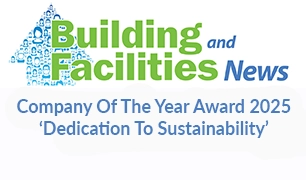Due this Autumn, and expected to set precedence at the 26th UN Climate Change Conference (COP26) in Glasgow this October/November 2021, the government’s net zero strategy continues to attract criticism. Last November, Prime Minister Boris Johnson announced a wide-ranging plan with ten key deliverables to drive what he described as “Our green industrial revolution.” This was to be supported by a £4bn investment which was both celebrated, but also met with concern that this would simply not be enough of an investment.
Whilst the commercial sector has clamoured for better defined objectives and meaningful inducement to achieve the increasingly aggressive timetable, the Climate Change Committee (CCC) says climate leadership is being undermined by inadequate policies and poor implementation.
Set up under the 2008 Climate Change Act to independently advise the UK government on how to deal with global warming, this latest accusation is damning. The CCC says that, at current progress, only 20% of the UK’s ambitions up to 2035 will be achieved.
Previous carbon budgets set by the government were met through ‘easy wins’ such as shutting down coal-fired power stations. But as was predicted, with cuts in emissions at the scale demanded being far more complex to achieve future carbon budgets are no longer on track.
The CCC has directed its complaints at the lack of engagement being made with the public to make essential changes for protecting the climate. This is similarly mirrored across the commercial sector, here despite major organisations making the effort to engage in sustainability planning, government policy to date has failed to engage, instead focussing rhetoric upon domestic and large-scale industrial planning. This is baffling considering commercial buildings currently generate up to 40% of the nation’s carbon emissions from heating.
Recommendations for Sustainable Heating & Power
The CCC’s recommendations concerning heating and power likewise lean toward domestic use, wanting to see the curtailment of gas boilers by 2035 in new build properties, with a conversion to heat pumps. They make clear this process requires subsidising of installations costs to succeed. Heat pumps are simple to install in a new build but become complex with higher capital investment required when dealing with refurbishing properties with an existing gas system. This is exacerbated by scale and high-temperature demands for DHW in commercial properties. If this process of change is to happen in any meaningful way considerable subsidies need to be put in place to drive the replacement of ageing, “dirty” systems that could conceivably continue to operate for a decade or more under normal servicing processes. As the CCC states, this requires better engagement to induce change.
The CCC also wants to see taxes taken off clean electricity – though the government currently lacks policies on these issues and others, including waste and low-carbon heat networks. It’s a call echoed by Andy Ford, Professor of Building Systems Engineering at London South Bank University (LBSU), who has stated that, “Massive cultural changes do not happen without stimulus.” Reforming energy costs and subsidies is one example of the wholesale changes needed to begin making progress on the mass adoption of cleaner technologies to decarbonise heating.
The objective of achieving near-zero emissions in the UK by 2050, with a 78% cut in emissions by 2035, is to be embraced, but “Almost all things that should have happened have either been delayed or not hit the mark,” said committee chairman Lord Deben.
Whilst the government response that it will “Set out more of the very policies the Climate Change Committee is calling for as we redouble our efforts,” is encouraging, there is a recognised delay in Whitehall relating to decarbonisation initiatives. These include the Environment Bill, the transport decarbonisation plan and a net zero aviation strategy, which are likely to take precedence over the commercial built environment. Critically for the built environment, the government’s delayed heat and buildings strategy, which is expected to detail firmer commitments around the role of different low carbon technologies such as heat pumps, hydrogen boilers and district heat, is yet to be published. All this is leading to concerns over the “gulf between promises and actions” according to the CCC‘s chief executive Chris Stark. Following these comments by the CCC, Parliament’s Environmental Audit Committee (EAC) has warned that the Government must do more to ensure the availability of practical low carbon heating options at a reasonable cost.
Increasing Risks from Climate Change
With the risks of climate change to the UK being even higher than were appreciated just five years ago, the clock is ticking if we are to avoid regular cycles of 40C temperatures highs. Critical then is the delayed Treasury net zero review, which will determine how much cash is invested into the projected zero-carbon economy. Recent statements that focus heavily on domestic resolutions, with little addressing of commercial, outside of schools and hospitals, remains a concern.
While the commercial sector awaits greater clarification, talk to Adveco about how you can bridge the gap from current gas-based systems by leveraging high-efficiency, low-carbon and renewable technologies to reduce operational costs and drive sustainability within your commercial hot water and heating systems.
 Discover more about Adveco’s range of services including air source heat pumps, solar thermal and heat recovery systems for commercial sustainability.
Discover more about Adveco’s range of services including air source heat pumps, solar thermal and heat recovery systems for commercial sustainability.
Call us on 01252 551 540 or use the contact form.
















